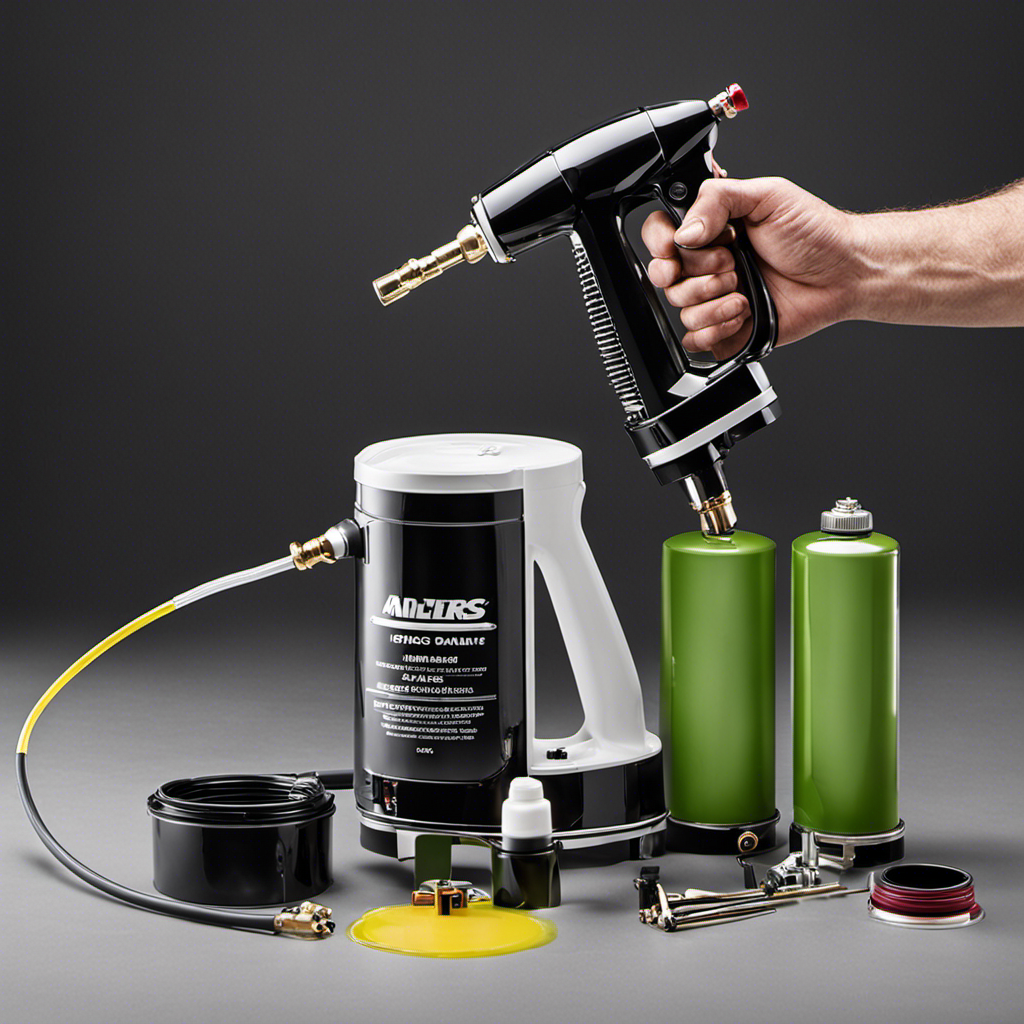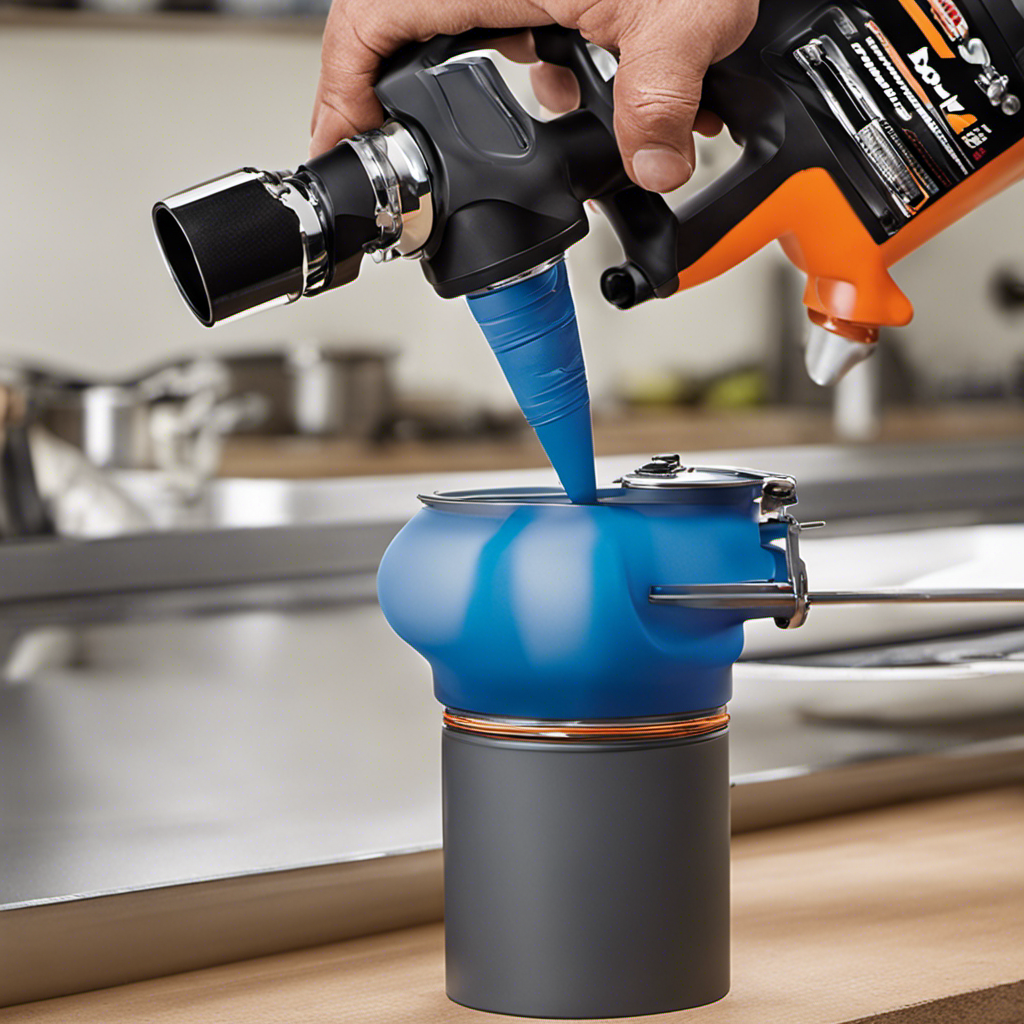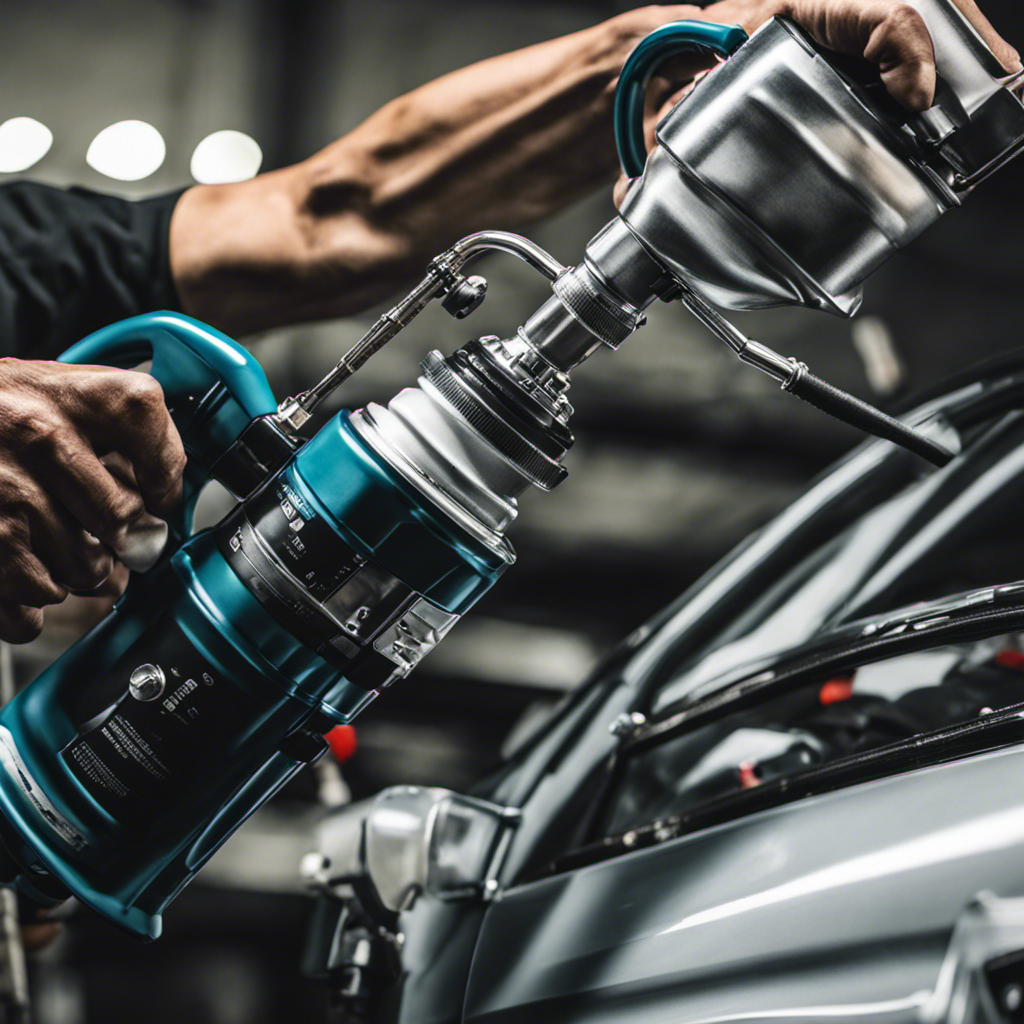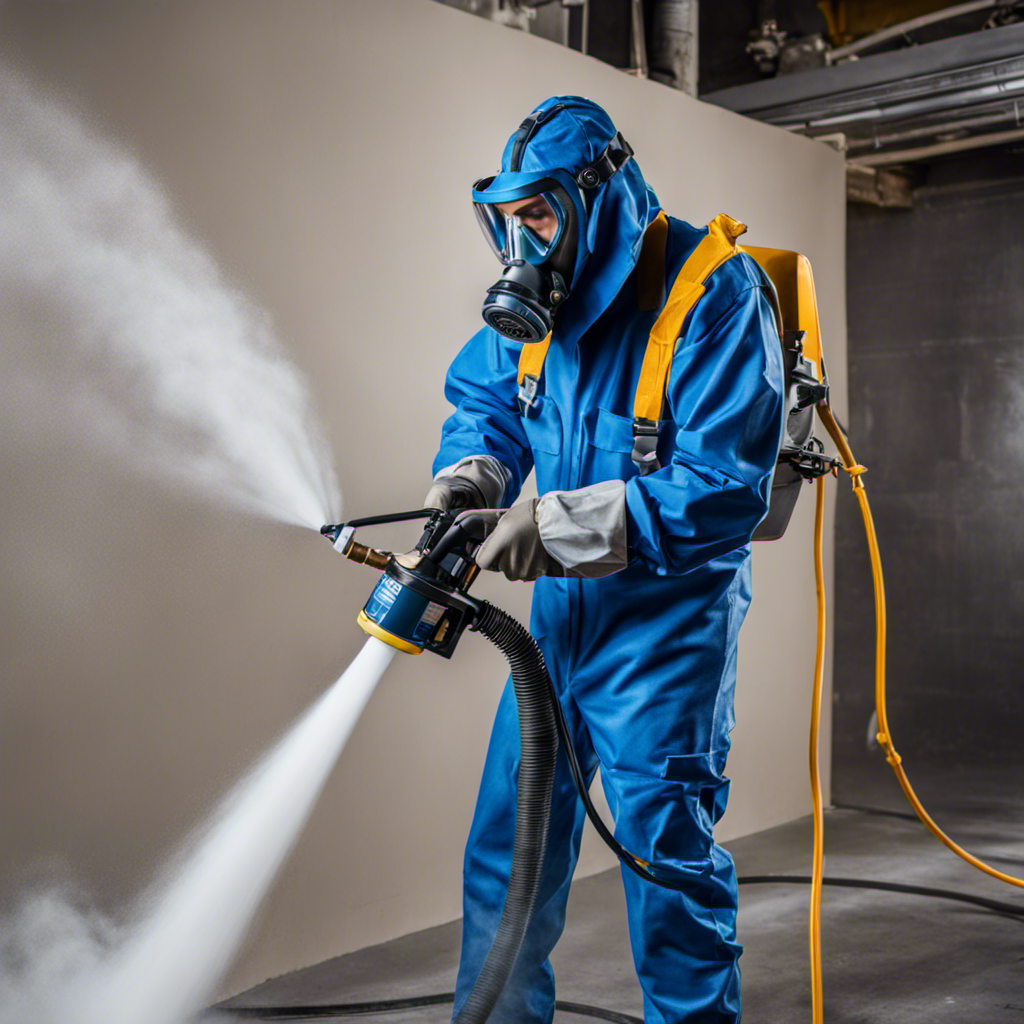If your sprayer makes a grinding or whining noise, it likely points to mechanical issues like worn bearings, loose parts, or debris inside the pump or nozzle. A high-pitched whine often indicates motor or pump problems, while grinding suggests internal components rubbing or lacking lubrication. Rattling might come from loose screws or panels. To keep your sprayer running smoothly, you’ll want to check for these issues and perform regular maintenance. Keep going to discover more tips to fix and prevent these noises.
Key Takeaways
- A high-pitched whining often indicates motor or pump bearing issues needing inspection.
- Grinding sounds suggest internal component friction or lack of lubrication within the pump or motor.
- Rattling may be caused by loose parts, such as screws, panels, or worn belts.
- Persistent noises despite tightening parts could signal worn bearings or internal damage.
- Regular maintenance and prompt repair prevent noise-related damage and ensure optimal sprayer performance.
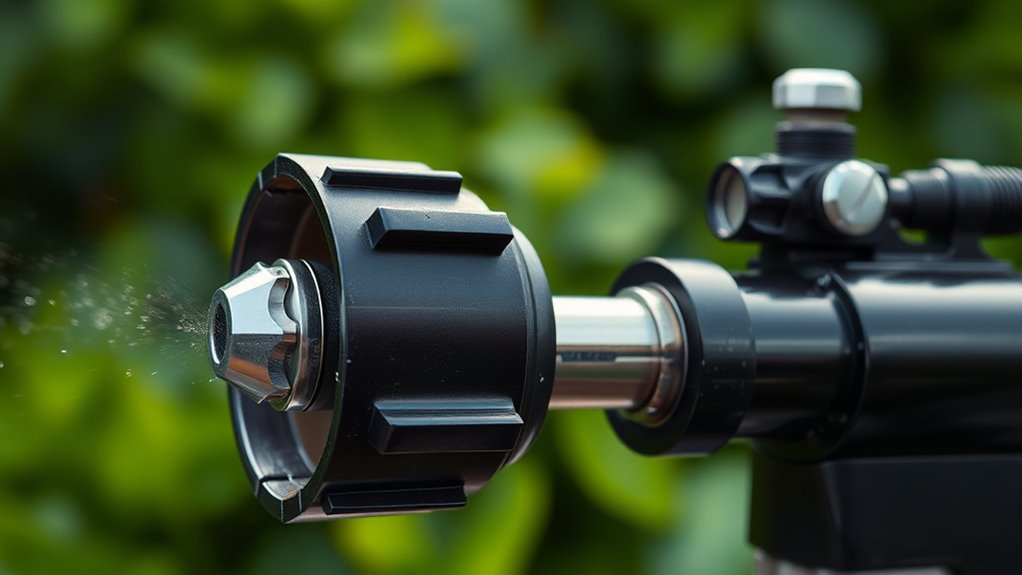
If your sprayer starts making unusual noises, it’s a sign that something may be wrong. These sounds, whether grinding, whining, or rattling, shouldn’t be ignored. They often indicate a mechanical issue that, if left unaddressed, could lead to more serious damage or complete failure of your equipment. Recognizing the early signs can save you time and money, so it’s vital to perform regular maintenance checks and follow troubleshooting tips when you notice these noises.
Unusual noises in your sprayer signal potential mechanical issues needing prompt attention.
First, identify the type of sound your sprayer is making. A high-pitched whining often points to a problem with the motor or pump, such as worn bearings or a loose belt. Grinding noises may suggest that internal components are rubbing against each other, perhaps due to lack of lubrication or debris lodged inside the mechanism. Rattling sounds could come from loose parts, such as screws, fittings, or panels that have come undone. Each noise pattern provides clues about where to look and what to fix.
Start your troubleshooting process by inspecting your sprayer thoroughly. Check the motor and pump for any signs of wear or damage. Confirm that all belts, pulleys, and moving parts are tight and properly aligned. If you find any loose components, tighten them according to the manufacturer’s specifications. Look for debris or obstructions inside the pump or nozzle area, as trapped dirt or residue can cause unusual sounds and impair performance. Also, examine hoses and connections for leaks or cracks, since pressure fluctuations can generate abnormal noises. Regularly performing maintenance and keeping parts well-lubricated can help prevent these issues from escalating.
Performing routine maintenance checks is essential to prevent these issues from escalating. Regularly lubricate moving parts as recommended, and replace worn-out belts or seals promptly. Keep the sprayer clean and free of buildup that might interfere with its operation. Using troubleshooting tips from your equipment’s manual can help you identify specific problems quickly. For instance, if a whining persists even after tightening all parts, it might be a sign of motor bearing failure, which usually requires replacement.
If you’re unsure about the cause of the sound or how to fix it, don’t hesitate to consult professional repair services or contact the manufacturer. Ignoring strange noises can lead to costly repairs or the need for complete replacement of your sprayer. Always prioritize safety: turn off and disconnect your equipment before performing any inspections or repairs. By staying vigilant and performing regular maintenance checks, you’ll keep your sprayer running smoothly, avoid unexpected breakdowns, and guarantee efficient operation every time you use it.
Frequently Asked Questions
Can Unusual Noises Indicate a Safety Hazard?
Unusual noises can definitely signal safety concerns, so you shouldn’t overlook them. Noise detection helps you identify potential issues early, preventing accidents or equipment damage. If your sprayer makes grinding or whining sounds, it’s a sign to stop and inspect immediately. Addressing these sounds promptly keeps you safe and ensures your equipment operates correctly. Always pay attention to odd noises—they’re often warning signals you can’t afford to overlook.
How Can I Prevent My Sprayer From Making Strange Sounds?
To prevent your sprayer from making strange sounds, perform regular maintenance checks and noise diagnosis. Keep all parts properly lubricated, and inspect hoses and connections for wear or leaks. Tighten loose components and replace worn-out parts promptly. Avoid overworking the sprayer, and listen carefully for any unusual noises during operation. Regular maintenance minimizes the risk of grinding or whining sounds, ensuring smooth, quiet performance and extending your equipment’s lifespan.
Are There Specific Tools Needed to Diagnose Noise Issues?
Think of noise diagnosis as tuning into your sprayer’s secret language. You’ll need specific diagnostic tools like a stethoscope for pinpointing sounds and a multimeter for electrical issues. These tools act as your detective’s magnifying glass, revealing hidden problems behind grinding or whining noises. With them, you can isolate the source quickly, making repairs smoother and preventing future disturbances that disrupt your spraying routine.
Do Different Sprayer Models Produce Different Types of Noises?
Different sprayer models do produce varying types of noises due to their unique sprayer design. You’ll notice that noise variation depends on factors like pump type, motor size, and overall construction. Some models may generate whines, hums, or grinding sounds, reflecting their specific design features. By understanding these differences, you can better identify what normal operation sounds like and when a noise indicates a potential issue with your sprayer.
How Often Should I Inspect My Sprayer for Potential Problems?
Ever wonder if your sprayer’s secretly plotting against you? Regular inspections are your best defense. You should check it before each use and perform routine maintenance weekly to catch issues early. Well-trained operators know how to spot problems, preventing costly repairs. Skipping inspections risks surprises — like grinding or whining sounds. So, stay vigilant, keep up with routine maintenance, and guarantee proper operator training to keep your sprayer in tip-top shape.
Conclusion
Whenever your sprayer makes that grinding or whining noise, don’t ignore it—think of it as a modern-day canary in a coal mine. These sounds often signal a problem that, if left unchecked, could turn into a real pickle, like a broken gear or worn-out bearing. So, take a cue from the brave explorers of yore, and investigate promptly. Trust me, catching the issue early keeps your sprayer humming smoothly, much like a finely-tuned automaton.
Franz came aboard the Paint Sprayer Zone team with a background in both journalism and home renovation. His articulate writing style, combined with a passion for DIY projects, makes him an invaluable asset. Franz has a knack for breaking down technical jargon into easy-to-understand content, ensuring that even the most novice of readers can grasp the complexities of paint sprayers.



